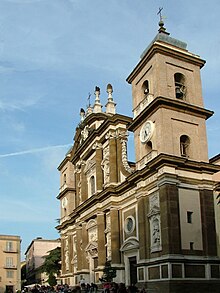This article has multiple issues. Please help improve it or discuss these issues on the talk page. (Learn how and when to remove these messages)
|

Frascati Cathedral (Italian: Basilica Cattedrale di San Pietro Apostolo, Duomo di Frascati) is a Roman Catholic cathedral and minor basilica in Frascati, Italy. Dedicated to Saint Peter the Apostle, it is the seat of the Bishop of Frascati.
Construction
Construction on the present building (the fifth cathedral of this see) began in 1598, to the designs of Ottaviano Nonni (best known as Mascherino). After twelve years, on 29 June 1610 the first Mass was celebrated. In 1696 Girolamo Fontana began work on a new façade, which was finished in 1700. The two bell towers on either side of it were constructed later.
Description
The cathedral is built on a Greek cross floorplan, and houses a wooden crucifix of the 11th century from Tusculum, a Madonna (Mysteries of the Rosary) attributed to Domenichino, a relief by Pompeo Ferrucci (1612) representing Jesus handing over the keys to Saint Peter, and a 14th-century Madonna and Child in the Chapel of the Gonfalone, that was retouched by Domenichino.
On the interior side of the west front there is a bronze "Holy Year Cross" of 1750.
1943 bombing
The interior of the cathedral was destroyed by bombing on 8 September 1943, and so today it appears bare, except for a little chapel off to the right.
Funerary monument to Charles Edward Stuart
In the nave, on the inner side of the façade, there is a white marble funerary monument to Charles Edward Stuart, the Young Pretender, with a memorial tablet. When he died in 1788, his brother, the Cardinal Duke of York and bishop of Frascati, Henry Benedict Stuart, celebrated his funeral here. The cathedral received many tokens of Henry's episcopal concern, most of which are still visible today. When the body of Charles Stuart was transferred to Saint Peter's Basilica in 1807 after the death of Henry, his heart and praecordia were left here in a small urn, placed under the floor below the funerary monument.
See also
References and notes
- since 1 March 1975
- Tusculum was the place of origin of the bishopric now seated in Frascati
External links
- Official website Archived 2018-06-18 at the Wayback Machine (in Italian)
- History from Official site (in Italian)
41°48′27″N 12°40′54″E / 41.80758611°N 12.68159167°E / 41.80758611; 12.68159167
Categories:- Roman Catholic churches completed in 1610
- Roman Catholic churches completed in 1700
- 17th-century Roman Catholic church buildings in Italy
- Churches in the metropolitan city of Rome
- Roman Catholic churches in Lazio
- Roman Catholic cathedrals in Italy
- Baroque architecture in Lazio
- 1610 establishments in the Papal States
- 1610 establishments in Italy
- Cathedrals in Lazio
- Henry Benedict Stuart
- Charles Edward Stuart